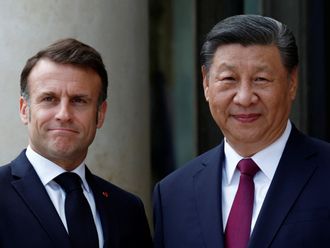London
Prime Minister Theresa May is battling a Cabinet revolt over her plan to tie the UK closely to European Union trade rules, in a clash that risks destroying hopes of progress in Brexit talks.
Just hours before May’s team is due to finalise the UK blueprint, a group of seven pro-Brexit ministers met in Foreign Secretary Boris Johnson’s offices to coordinate their opposition to the premier’s policy and push for changes, people familiar with the situation said.
For her part, May is also ready for a fight, one of her senior allies said.
The Brexit backers’ concerns include May’s plan for a customs deal in which the UK collects the EU’s tariffs, and a trade regime that binds British regulations on goods and agri-food to European rules forever.
“If true, this would be a complete breach of Theresa May’s manifesto commitment” to leave the EU single market, customs union and the bloc’s court, said Owen Paterson, a former Cabinet minister and Brexit campaigner. “We would be out of Europe but still run by Europe.”
The rebellion came as May settled on the type of Brexit she wants at a critical moment in the negotiations. The EU is pushing her to come up with a workable plan for the future trade relationship, warning that time is running out for reaching an agreement before exit day in March.
Betrayal
May has summoned her Cabinet to an all-day meeting at her country residence, Chequers, on Friday, with the goal of securing their support for an overarching plan — in the form of a government “white paper” — to take to the EU.
Brexit backers among May’s top team are worried that she’s betraying their vision of a clean split with the bloc that will enable Britain to strike free trade deals with countries around the world such as the US.
The seven “Brexiteer” ministers held constructive talks in Johnson’s office and want to work through their differences with May, according to people familiar with the discussions. As well as Johnson, the ministers present in the Foreign Office included Brexit Secretary David Davis, Development Secretary Penny Mordaunt, Work and Pensions Secretary Esther McVey, Andrea Leadsom, the Commons leader, and Michael Gove, the environment secretary, according to a person familiar with the matter.
Fox left the meeting of Brexiteers for private talks with May over a drink in her apartment in Downing Street at which he raised a number of issues. She gave him a personal assurance that Brexit would allow Britain to strike free trade deals around the world, a person familiar with the matter said. Fox now expects May to clarify the points discussed at Friday’s cabinet meeting.
Pro-Brexit ministers are angry that May’s aides devised the plan without consulting senior Cabinet members who were supposed to be working on a customs solution. It has also received a chilly response from German Chancellor Angela Merkel’s government.
A draft of May’s proposal was leaked on Thursday, including a line saying it wouldn’t “allow the UK to accommodate a likely ask from the US in a future trade deal.” That upset the “Brexiteers” in the Cabinet who have made an American trade deal one of their key aims.
May’s office hit back at the leak, with one official saying the line had been selectively quoted. The prime minister’s spokeswoman Alison Donnelly said May remains committed to seeking an agreement with America.
“It is categorically untrue to suggest that we will not be able to strike a trade deal with the US,” she said.
According to one of May’s Cabinet allies, who spoke on condition of anonymity, the prime minister views other kinds of relationship with the EU — typically ones modelled on Canada’s or on Norway’s — as either unacceptable or unworkable.
Quitting without a deal, as proposed by some in May’s Conservative Party, would leave the UK in a bitter and acrimonious relationship with the EU just as it was trying to sort out side-deals in areas such as aviation that Britain would still need.
While May’s delay in making a decision on Brexit has been characterised by weakness, and left some in her government wondering if she would ever make a decision, the minister said this had been a strategy aimed at leading her internal opponents to the same conclusion as her about the viable options.
At Chequers, the minister said, she was prepared to push for what she wanted, even if it meant upsetting people. It’s a political convention in the UK that ministers who feel they cannot sign up to government policy are expected to resign from the Cabinet.












